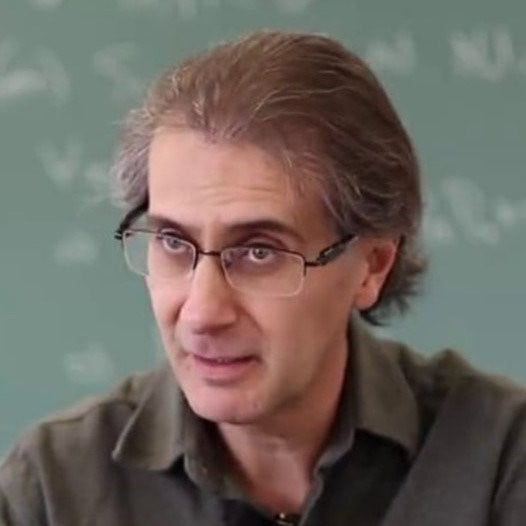
Journal Menu
► ▼ Journal Menu-
- Mathematics Home
- Aims & Scope
- Editorial Board
- Reviewer Board
- Topical Advisory Panel
- Instructions for Authors
- Special Issues
- Topics
- Sections & Collections
- Article Processing Charge
- Indexing & Archiving
- Editor’s Choice Articles
- Most Cited & Viewed
- Journal Statistics
- Journal History
- Journal Awards
- Society Collaborations
- Conferences
- Editorial Office
Journal Browser
► ▼ Journal BrowserNeed Help?
Announcements
14 December 2022
"Thanks a Million!" – One Million Articles Published in MDPI Journals
MDPI has just become the first open access (OA) publisher to reach the milestone of one million articles published. That is one million articles freely available to all, to circulate and build upon! We are proud to share this special moment with the global scientific community.
This landmark has been reached thanks to the immeasurable support of more than 600,000 expert reviewers, 66,000 editorial board members and 6700 hard-working colleagues across MDPI’s global offices.
Within more than 25 years of publishing, our journals received 2.1 million manuscripts and generated 4.6 million peer review reports to get to one million papers published.
Reaching the milestone of one million articles published reinforces our mission to remove any existing barriers and to make scientific research accessible to all. Since its inception, MDPI’s goal has been to create reliable processes to make science open. This is a path towards facilitating the dissemination of novel insights in scientific communities.
Regular feedback from authors and reviewers shows that our service is greatly appreciated and needed. At the same time, the feedback helps us identify areas for further improvement.
As it stands, a significant share of published research findings remain closed access. More than half of the content published with the most well-known legacy publishers stays behind a paywall, and that is not including articles published in hybrid OA journals, or made available months or years after publication.
A new policy announced by the US administration in August 2022 requires that, as of January 2026, all US federally funded research be made freely and immediately available after publication. While the new policy does not mandate articles be published under an open access license, it is aligned with the open access movement in removing all barriers to research. Similarly, some of the most advanced research institutions in the world intend to have all funded research articles published in open access by 2025.
MDPI is proud to be the leading agent of the transition to open access.
"Thanks a Million" to all the contributors!
8 December 2022
MDPI Sustainability Foundation: New Look and Nominations for the 2023 Sustainability Awards Now Open

We are pleased to announce that the website of the MDPI Sustainability Foundation has been revamped! For the past couple of months, our UX UI team and front-end developers have been working hard to launch the website in time for the opening of the Sustainability Awards nominations.
The website is not the only thing that has had a remodeling. Indeed, the format of the Emerging Sustainability Leader Award (ESLA) has been updated. ESLA is now a competition open to individual researchers or start-ups founded by researchers under the age of 35. Nominee applications will go through 2 rounds of selection until the final 3 are decided. The finalists will then be invited to give pitch presentations during the Award Ceremony to win either first place (10,000 USD) or runner-up (2 x 5000 USD).
The World Sustainability Award, on the other hand, remains the same: a total prize money of 100,000 USD is up for grabs by senior individual researchers or groups of researchers from the international research community.
Nominations for both the World Sustainability Award and the Emerging Sustainability Leader award are now open! Check out our new website for more information on how to nominate.
6 December 2022
Mathematics | Top 10 Cited Papers in 2021 in the Section “Dynamical Systems”
1. “Leveraging Elasticity to Uncover the Role of Rabinowitsch Suspension through a Wavelike Conduit: Consolidated Blood Suspension Application”
by Sara I. Abdelsalam and Abdullah Z. Zaher
Mathematics 2021, 9(16), 2008; https://doi.org/10.3390/math9162008
Full text available online: https://www.mdpi.com/2227-7390/9/16/2008
2. “Bioconvection Reiner-Rivlin Nanofluid Flow between Rotating Circular Plates with Induced Magnetic Effects, Activation Energy and Squeezing Phenomena”
by Muhammad Bilal Arain, Muhammad Mubashir Bhatti, Ahmad Zeeshan and Faris Saeed Alzahrani
Mathematics 2021, 9(17), 2139; https://doi.org/10.3390/math9172139
Full text available online: https://www.mdpi.com/2227-7390/9/17/2139
3. “Double Solutions and Stability Analysis of Micropolar Hybrid Nanofluid with Thermal Radiation Impact on Unsteady Stagnation Point Flow”
by Nur Syazana Anuar and Norfifah Bachok
Mathematics 2021, 9(3), 276; https://doi.org/10.3390/math9030276
Full text available online: https://www.mdpi.com/2227-7390/9/3/276
4. “LMI-Observer-Based Stabilizer for Chaotic Systems in the Existence of a Nonlinear Function and Perturbation”
by Hamede Karami, Saleh Mobayen, Marzieh Lashkari, Farhad Bayat and Arthur Chang
Mathematics 2021, 9(10), 1128; https://doi.org/10.3390/math9101128
Full text available online: https://www.mdpi.com/2227-7390/9/10/1128
5. “Finance for the Environment: A Scientometrics Analysis of Green Finance”
by Rui Cai and Jianluan Guo
Mathematics 2021, 9(13), 1537; https://doi.org/10.3390/math9131537
Full text available online: https://www.mdpi.com/2227-7390/9/13/1537
6. “Hidden Strange Nonchaotic Attractors”
by Marius-F. Danca and Nikolay Kuznetsov
Mathematics 2021, 9(6), 652; https://doi.org/10.3390/math9060652
Full text available online: https://www.mdpi.com/2227-7390/9/6/652
7. “Performance Analysis on the Use of Oscillating Water Column in Barge-Based Floating Offshore Wind Turbines”
by Payam Aboutalebi, Fares M’zoughi, Izaskun Garrido and Aitor J. Garrido
Mathematics 2021, 9(5), 475; https://doi.org/10.3390/math9050475
Full text available online: https://www.mdpi.com/2227-7390/9/5/475
8. “An Optimal Derivative Free Family of Chebyshev–Halley’s Method for Multiple Zeros”
by Ramandeep Behl, Sonia Bhalla, Ángel Alberto Magreñán and Alejandro Moysi
Mathematics 2021, 9(5), 546; https://doi.org/10.3390/math9050546
Full text available online: https://www.mdpi.com/2227-7390/9/5/546
9. “Research on Optimization of Array Honeypot Defense Strategies Based on Evolutionary Game Theory”
by Leyi Shi, Xiran Wang and Huiwen Hou
Mathematics 2021, 9(8), 805; https://doi.org/10.3390/math9080805
Full text available online: https://www.mdpi.com/2227-7390/9/8/805
10. “High-Order Filtered PID Controller Tuning Based on Magnitude Optimum”
by Damir Vrančić and Mikuláš Huba
Mathematics 2021, 9(12), 1340; https://doi.org/10.3390/math9121340
Full text available online: https://www.mdpi.com/2227-7390/9/12/1340
6 December 2022
Mathematics | Top 10 Cited Papers in 2021 in the Section “Difference and Differential Equations”
| 1. “New General Variants of Chebyshev Type Inequalities via Generalized Fractional Integral Operators” by Ahmet Ocak Akdemir, Saad Ihsan Butt, Muhammad Nadeem and Maria Alessandra Ragusa Mathematics 2021, 9(2), 122; https://doi.org/10.3390/math9020122 Full text available online: https://www.mdpi.com/2227-7390/9/2/122 |
| 2. “Analysis of the Time Fractional-Order Coupled Burgers Equations with Non-Singular Kernel Operators” by Noufe H. Aljahdaly, Ravi P. Agarwal, Rasool Shah and Thongchai Botmart Mathematics 2021, 9(18), 2326; https://doi.org/10.3390/math9182326 Full text available online: https://www.mdpi.com/2227-7390/9/18/2326 |
| 3. “A Link between Approximation Theory and Summability Methods via Four-Dimensional Infinite Matrices” by Hari M. Srivastava, Khursheed J. Ansari, Faruk Özger and Zeynep Ödemiş Özger Mathematics 2021, 9(16), 1895; https://doi.org/10.3390/math9161895 Full text available online: https://www.mdpi.com/2227-7390/9/16/1895 |
| 4. “Models for COVID-19 Daily Confirmed Cases in Different Countries” by Hamdy M. Ahmed, Reda A. Elbarkouky, Othman A. M. Omar and Maria Alessandra Ragusa Mathematics 2021, 9(6), 659; https://doi.org/10.3390/math9060659 Full text available online: https://www.mdpi.com/2227-7390/9/6/659 |
| 5. “Fractional System of Korteweg-De Vries Equations via Elzaki Transform” by Wenfeng He, Nana Chen, Ioannis Dassios, Nehad Ali Shah and Jae Dong Chung Mathematics 2021, 9(6), 673; https://doi.org/10.3390/math9060673 Full text available online: https://www.mdpi.com/2227-7390/9/6/673 |
| 6. “Semi-Hyers–Ulam–Rassias Stability of the Convection Partial Differential Equation via Laplace Transform” by Daniela Marian Mathematics 2021, 9(22), 2980; https://doi.org/10.3390/math9222980 Full text available online: https://www.mdpi.com/2227-7390/9/22/2980 |
| 7. “Alikhanov Legendre—Galerkin Spectral Method for the Coupled Nonlinear Time-Space Fractional Ginzburg–Landau Complex System” by Mahmoud A. Zaky, Ahmed S. Hendy and Rob H. De Staelen Mathematics 2021, 9(2), 183; https://doi.org/10.3390/math9020183 Full text available online: https://www.mdpi.com/2227-7390/9/2/183 |
| 8. “A General Family of q-Hypergeometric Polynomials and Associated Generating Functions” by Hari Mohan Srivastava and Sama Arjika Mathematics 2021, 9(11), 1161; https://doi.org/10.3390/math9111161 Full text available online: https://www.mdpi.com/2227-7390/9/11/1161 |
| 9. “On Sharp Oscillation Criteria for General Third-Order Delay Differential Equations” by Irena Jadlovská, George E. Chatzarakis, Jozef Džurina and Said R. Grace Mathematics 2021, 9(14), 1675; https://doi.org/10.3390/math9141675 Full text available online: https://www.mdpi.com/2227-7390/9/14/1675 |
| 10. “Stability of Systems of Fractional-Order Differential Equations with Caputo Derivatives” by Oana Brandibur, Roberto Garrappa and Eva Kaslik Mathematics 2021, 9(8), 914; https://doi.org/10.3390/math9080914 Full text available online: https://www.mdpi.com/2227-7390/9/8/914 |
18 November 2022
Editorial Board Members from Mathematics Featured in Stanford’s List of the World’s Top 2% Scientists
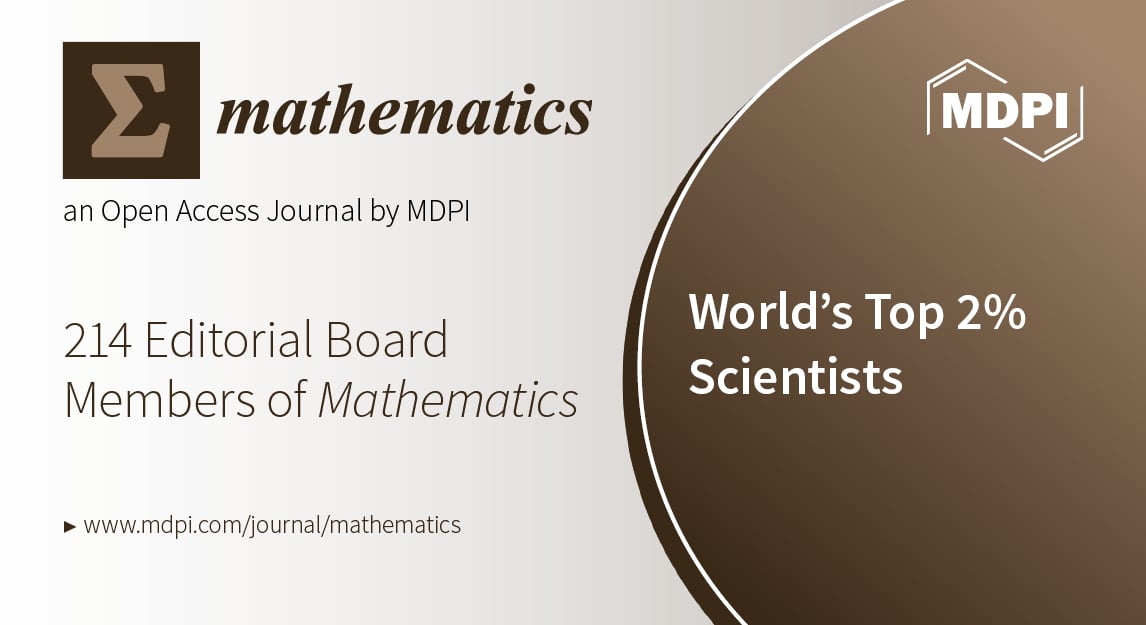
Scientists at Standford have recently published an update of the list of the top 2% most widely cited scientists. The time node of the statistical data of this list is from 1960 to 2022, and it is divided into two lists: "Lifetime Scientific Influence Ranking" and "2022 Annual Scientific Influence Ranking". The "Lifetime Scientific Influence Ranking" counts the comprehensive influence performance of scientists during their careers, and the "2022 Annual Influence Ranking" focuses on highlighting the academic influence of scientists in the previous year. This ranking, considered the most prestigious worldwide, is based on the bibliometric information contained in the Scopus database and includes more than 200,000 researchers from the more than 10 million scientists considered to be active worldwide, with 22 scientific fields and 176 subfields taken into account.
We are pleased to share that 214 Editorial Board Members from MDPI’s Mathematics (ISSN: 2227-7390) were featured in Stanford University World’s Top 2% Scientists list in 2022.
| Adil Bagirov | Ivan Kaygorodov | Przemysław Grzegorzewski |
| Alberto Cabada | Ivan T. Ivanov | Radu Tudor Ionescu |
| Alberto Fernández | Ivanka Stamova | Rami Ahmad El-Nabulsi |
| Alexander Dudin | Ivo Petráš | Ravi P. Agarwal |
| Ali Farajpour | Jacob Biamonte | Richard L. Magin |
| Amir Mosavi | Jakub Nalepa | Richard Linares |
| Andrey Jivkov | James J.H. Liou | Ripon K. Chakrabortty |
| Anthony To Ming Lau | Janusz Brzdęk | Roberto Furfaro |
| Antonio Di Nola | Jaume Giné | Rodica Luca |
| Antonio Elipe | Jesús Alcalá-Fdez | Roland W. Freund |
| Antonio M. Peralta | Jesús Medina | Rosana Rodríguez-López |
| Ben Niu | Jiajun Zhou | Salvador Romaguera |
| Beny Neta | Jiancang Zhuang | Salvatore Sessa |
| Bernard De Baets | Jiangping Hu | Sergei Petrovskii |
| Biao Tang | Jianping Gou | Sergey Dashkovskiy |
| Bo Zhou | Jianquan Lu | Sergio Gómez |
| Boqi Xiao | Jianshe Yu | Shan He |
| Carla M. A. Pinto | Jichun Li | Shaomin Wu |
| Carmen Chicone | Jie Wen | Shihua Zhang |
| Carsten Schneider | Jinfeng Liu | Simeon Reich |
| Changbum Chun | Jinguang Han | Simone Secchi |
| Christopher S. Goodrich | Jinhai Li | Sorana D. Bolboacă |
| Chuangyin Dang | Jinwen Ma | Sotiris K. Ntouyas |
| Chuanzhong Li | John Michael Rassias | Stanisław Migórski |
| Chunqiao Tan | José Antonio Sanz | Stephen S.T. Yau |
| Chunwei Tian | Jose L. Salmeron | Stoytcho Yazadjiev |
| Claes Johnson | Jose Luis Valverde | Tadashi Dohi |
| Congming Li | Julius Kaplunov | Takayuki Hibi |
| Constantin Zopounidis | Junjie Wei | Tianhai Tian |
| Cristina Pignotti | Junlin Hu | Tinh Quoc Bui |
| Dachun Yang | Junseok Kim | Tongxing Li |
| Daniele Mortari | Junyong Zhai | Umberto Morbiducci |
| Danny Barash | Junzo Watada | Vaclav Skala |
| David Allen | Kazufumi Ito | Valentin Goranko |
| Denis Sidorov | Kevin J. Grimm | Valeriu Beiu |
| Didier Felbacq | Krassimir Atanassov | Vasile Lupulescu |
| Dongsheng Yu | Krzysztof Kamil Żur | Vasily Novozhilov |
| Eckhard Hitzer | Lei Ni | Vilém Novák |
| Emilio Turco | Leimin Wang | Vladimir Batagelj |
| Enrico Zio | Levente Kovács | Wei Zhang |
| Ernesto Estrada | Liangxiao Jiang | Weihua Xu |
| Eugene B. Postnikov | Lingfeng Liu | Weimin Han |
| Ezequiel López-Rubio | Linlin Shen | Xiang Li |
| Francesco Aymerich | Lizhong Jiang | Xiangtao Zheng |
| Francesco Topputo | Lokenath Debnath | Xianguo Geng |
| Francisco C. Santos | Lothar Reichel | Xiaobing Feng |
| Francisco Chiclana | Luc Trouche | Xiaofeng Yang |
| Fuyuan Xiao | Lucio Boccardo | Xiaoying Zhuang |
| Gabriel Ciobanu | Luigi Fortuna | Xibei Yang |
| Gaston M. N'Guerekata | Lyle Noakes | Ximeng Liu |
| George A. Anastassiou | Manuel Pastor | Xing He |
| George C. Tsiatas | Marjan Mernik | Xingyuan Wang |
| George E. Chatzarakis | Martin Bohner | Xinsong Yang |
| Giuseppe Pirrò | Massimiliano Ferrara | Xinzhu Meng |
| Guiquan Sun | Matjaz Perc | Yanjie Fu |
| Haitao Li | Mehdi Toloo | Yegao Qu |
| Hari Mohan Srivastava | Michael T. Todinov | Yihong Du |
| Hendrik Richter | Michel Chipot | Yong Hyun Kim |
| Hengjie Zhang | Moo K. Chung | Yongtang Shi |
| Higinio Ramos | Nicu Bizon | Yucai Su |
| Hong Zheng | Nikolay V. Kuznetsov | Zenonas Turskis |
| Hongyu Liu | Nir Sochen | Zhao Kang |
| Huabin Chen | Oleg N. Kirillov | Zhaobin Wang |
| Huawen Liu | Olga I. Vinogradova | Zhaosheng Feng |
| Ichiro Tsuda | Omer San | Zhihua Zhang |
| Ignatios Antoniadis | Palle Jorgensen | Zhijia Zhao |
| Igor Podlubny | Paolo Mercorelli | Zhijie Liu |
| Ioannis Dassios | Pasi Luukka | Zhouchao Wei |
| Ioannis K. Argyros | Patricia J. Y. Wong | Zihua Guo |
| Ioannis K. Chatjigeorgiou | Patrick Siarry | Zongwei Lu |
| Ion Necoara | Peter Baranyi | |
| Irina Perfilieva | Pierre Auger |
The latest Stanford rankings reflect the significant influence and research excellence of the scientists, who are committed to furthering their knowledge for the benefit of the world.
We would like to congratulate our Editorial Board Members on their excellent achievement and thank them for their immense contribution to the scientific progression and development of Mathematics.
8 November 2022
Prof. Dr. Adolfo Ballester-Bolinches Appointed Section Editor-in-Chief of Section "Algebra and Geometry" in Mathematics
We are pleased to announce that Prof. Dr. Adolfo Ballester-Bolinches has been appointed Editor-in-Chief of the Section "Algebra and Geometry" in Mathematics (ISSN: 2227-7390).

Prof. Dr. Adolfo Ballester-Bolinches graduated from the University of Valencia (UV) Summa Cum Laude in Mathematical Sciences (1986), and is currently a university professor in the area of algebra at the Facultat de Matemàtiques de la UV, the university where he has served since 1986. He has taught undergraduate/graduate courses, and doctorate/master's degrees in mathematics.
Prof. Dr. Ballester-Bolinches has participated in research projects financed by national and international public organizations since 1988, and since 2004 he has served as principal investigator/coordinator of coordinated projects. He has published more than 270 scientific articles in prestigious international journals, of which approximately ninety-five percent appear in the "Mathematics" list of the Journal of Citation Reports Science Edition and eighty percent appear in the first and second third of the aforementioned list. Additionally, he has published two books, Classes of finite groups, with L. Ezquerro, Springer (2006), and Products of finite groups, with R. Esteban Romero and M. Asaad, W. De Gruyter (2010), which are basic references in the abstract theory of groups, with the number of citations to date equal to 605 and 378, respectively, using Google Scholar as a source. The number of citations of his publications is, as of today, 4169 with an h-index equal to 29, using Google Scholar as a source. Since 2017, his research work has received 1421 citations and corresponds to an h-index equal to 15 according to the same source. Currently, he is an advisor (referee) of more than 85 scientific journals, member of the editorial committee of 13 journals and reviewer of the Mathematical Reviews and Zentralblatt MATH.
Prof. Dr. Ballester-Bolinches has made numerous visits to several foreign universities within the framework of collaborative projects, in which he has taught various postgraduate courses and carried out research tasks. He was a plenary speaker in many international conferences on group theory and its applications. Now he serves as an advisor to Spanish and foreign project evaluation agencies and has been an evaluator of postgraduate works and doctoral theses at various universities. To date, he has supervised 14 doctoral theses and 9 master's theses/third-year research papers.
The following is a short Q&A with Prof. Dr. Adolfo Ballester-Bolinches, who shared his vision for the Section with us as well as his views on the research area:
1.What appealed to you about the journal that made you want to take the role as its Section Editor-in-Chief?
The main feature of this journal is its interdisciplinarity and its efficiency and speed in publishing articles. This directly affects the impact of these articles and contributes to improving the communication of their results.
2. What is your vision for the Section?
We need to attract quality researchers who publish good articles in this Section. We also must demand in the acceptance of the articles through rigorous selection criteria.
3. What does the future of this field of research look like?
Research in the field of algebra and geometry is an extremely important part of science that is essential for the development of mathematics and its applications in different areas. It is impossible to conceive of a good scientific development without good research in algebra and geometry.
4. What do you think of the development of Open Access in the publishing field?
It is one of the best ways to learn about and disseminate the results of scientific research.
5. What aspects do you focus on when reviewing a manuscript?
The novelty of the results and the techniques used in their development. Its potential impact on the corresponding scientific field.
6. Do you have any suggestions for young researchers in this field?
To work hard to contribute to the development of the area.
We wish Prof. Dr. Ballester-Bolinches every success in his new position, and we look forward to his contributions to the journal.
20 October 2022
Mathematics Webinar | Fractional Calculus and Its Applications, 25 November 2022
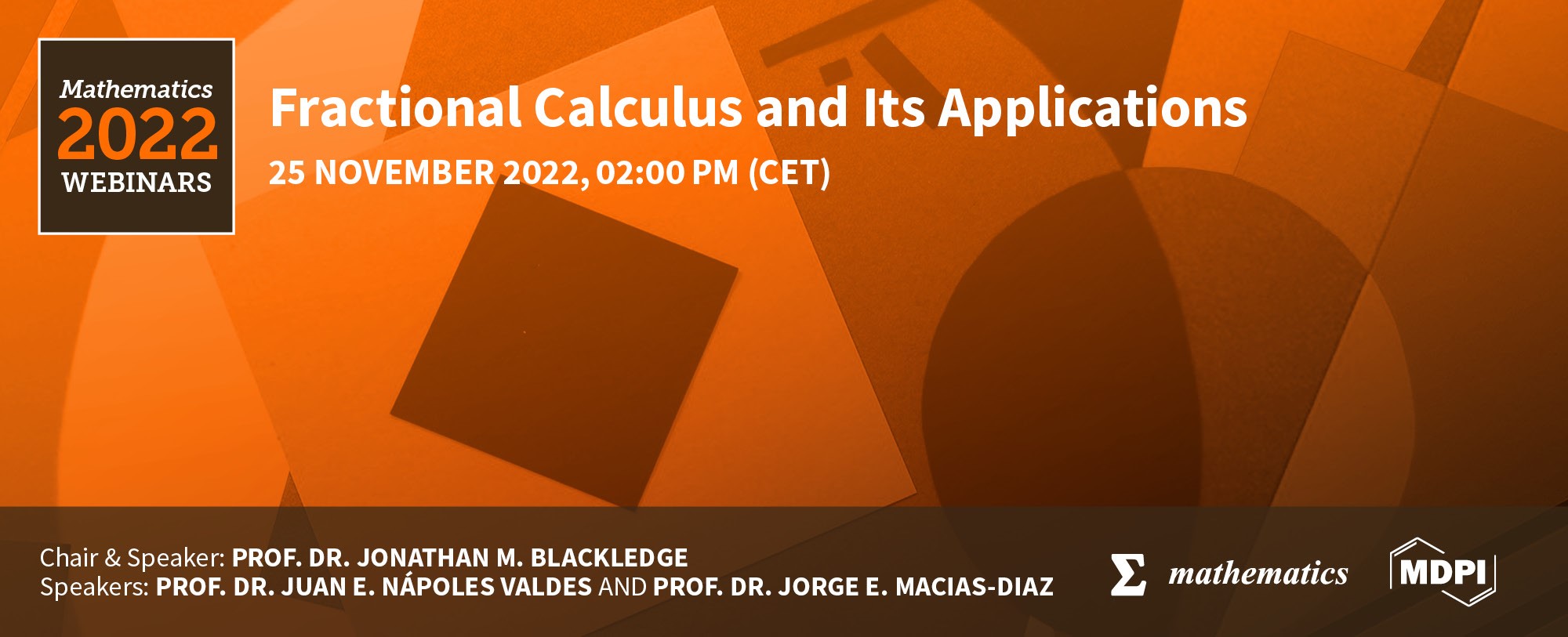
Date: 25 November 2022
Time: 02:00 p.m. (CET)
Webinar ID: 881 3441 2882
Register here:
https://us02web.zoom.us/webinar/register/2516636012244/WN_UMfiT_RKT5ucq1LZ1dfWJw
Participation fee: None
Language: English
Webinar keywords: fractional calculus; history and more recent applications; fractional differential equations; nonlinear dynamics; stochastic fields; analytical and numerical solutions; fractal geometry
Related Special Issues:
- “Abstract Fractional Integro-Differential Equations and Fixed Point Theory with Applications”;
- “Stability Analysis of Fractional Systems-II”;
- “Fractional Differential Equations and Control Problems”;
- “Fractional-Order Systems: Control, Modeling and Applications 2022”;
- “Applications of Fractional Calculus in Option Pricing”;
- “Fractional Calculus in Kinetic Theory”;
- “Fractional Calculus and Mathematical Applications”.
Chair:
|
|
Prof. Dr. Jonathan M. Blackledge SFI Stoke Professor School of Electrical and Electronic Engineering, Technological University Dublin, Ireland |
Speakers:
|
|
Prof. Dr. Juan E. Nápoles Valdes Facultad de Ciencias Exactas y Naturales y Agrimensura (FaCENA), Universidad Nacional del Nordest (UNNE), Argentina; |
|
|
Prof. Dr. Jorge E. Macias-Diaz Department of Mathematics and Didactics of Mathematics, Tallinn University, Estonia; |
28 September 2022
Peer Review Week 2022 – Research Integrity: Creating and Supporting Trust in Research
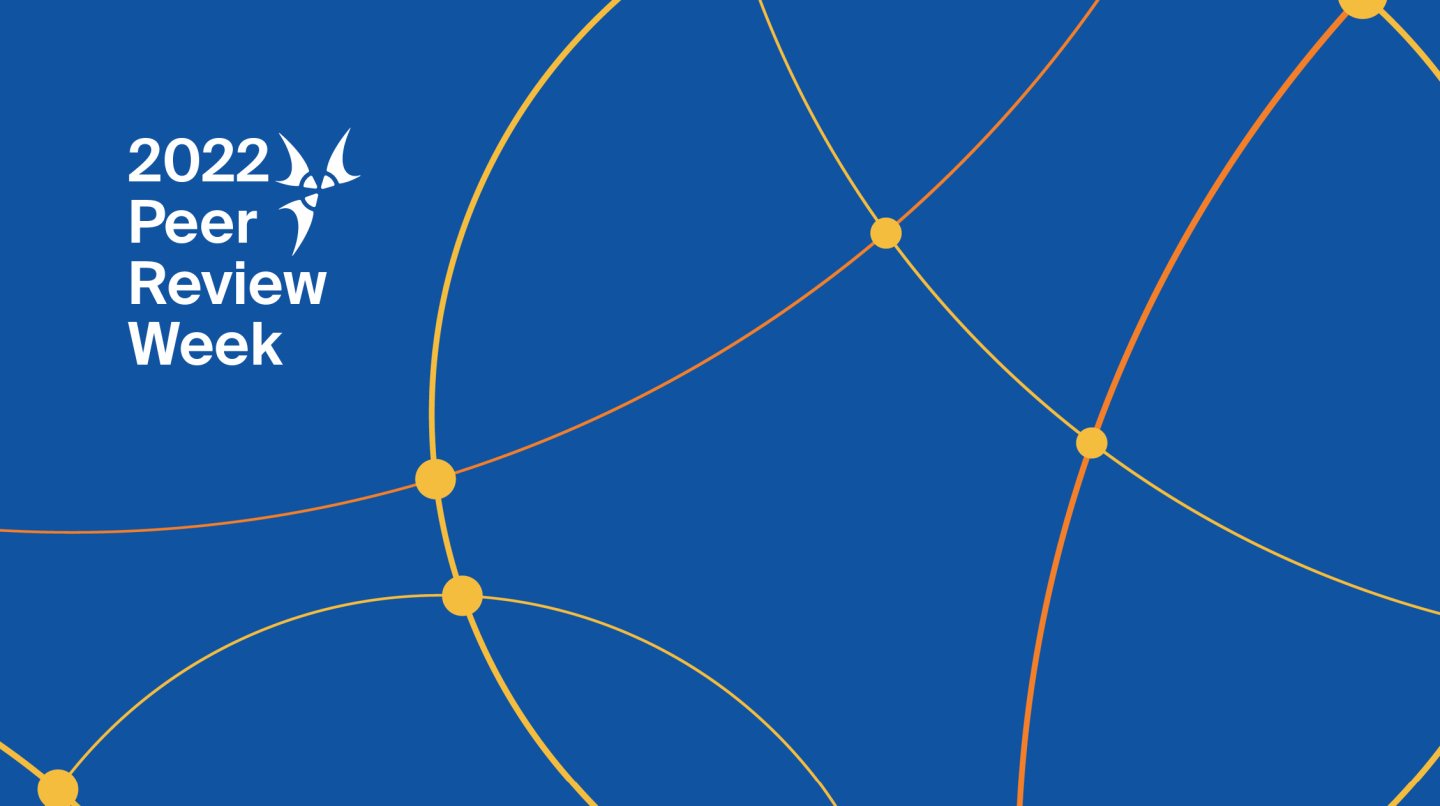
Peer Review Week began 19 September 2022 under the theme of “Research Integrity: Creating and Supporting Trust in Research”. Through various blog articles, podcast, and webinar, we discussed this crucial subject throughout the week, celebrating the essential role peer review plays in maintaining research quality.
To begin, we held a Webinar on the topic. Professor Peter W. Choate and Dr. Emmanuel Obeng-Gyasi joined Dr. Ioana Craciun, one of MDPI’s scientific officers, for an in-depth discussion.
We invite you to view the event recording:
During the week, the MDPI Blog in a series articles highlighted how good Peer Review safeguards research integrity. The following topics were covered:
- Peer Review Week 2022
- Research Integrity
- What We’ve Learned About Peer Review Reports
- 4 Steps to the Perfect Peer Review Report
- How to Write the Perfect Peer Review Report: An Interview
- Inviting Great Peer Reviewers
In a new edition of Insight Faster, an MDPI podcast, we were delighted to talk to the co-chairs of the Peer Review Week committee, Jayashree Rajagopalan (Senior Manager of Global Community Engagement for CACTUS) and Danielle Padula (Head of Marketing and Community Development at Scholastica) to get their take on this year’s event and its related topics.
You can find the Podcast here.
We hope you enjoy the contents!
20 September 2022
Meet Us at the Conference on Complex Systems (CCS2022), Palma de Mallorca, Spain, 17–21 October 2022
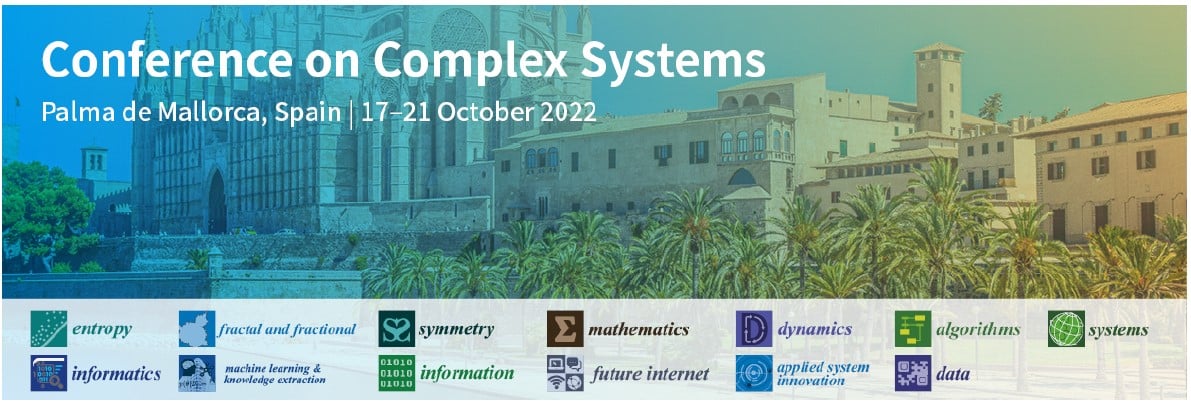
MDPI will be attending the Conference on Complex Systems (CCS2022) in Palma de Mallorca, Spain, which will take place from 17 to 21 October 2022. The CCS is the largest and most important annual meeting of the international complex systems community. It comes under the auspices of the Complex Systems Society. This edition, organized by IFISC, takes place after previous events held in Lyon, Singapore, Thessaloniki, and Cancun.
The following MDPI journals will be represented:
- Entropy;
- Fractal and Fractional;
- Symmetry;
- Mathematics;
- Dynamics;
- Algorithms;
- Systems;
- Informatics;
- MAKE;
- Information;
- Future Internet;
- Applied System Innovation;
- Data.
If you are attending this conference, please feel free to stop by our booth. Our delegates look forward to meeting you in person to answer any questions you may have. For more information about the conference, please visit the following link: https://www.ccs2022.org/.
27 July 2022
Prof. Dr. Massimiliano Ferrara Appointed Section Editor-in-Chief of Section "Financial Mathematics" in Mathematics
We are pleased to announce that Prof. Dr. Massimiliano Ferrara has been appointed Editor-in-Chief of the Section "Financial Mathematics" in Mathematics (ISSN: 2227-7390).
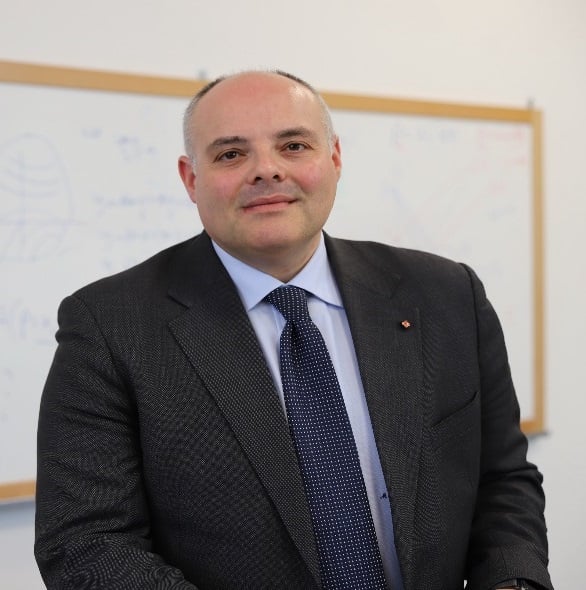
Prof. Dr. Massimiliano Ferrara is a Research Affiliate at ICRIOS – Invernizzi Center for Research on Innovation, Organization, Strategy and Entrepreneurship, Bocconi University, and a full professor of Mathematical Economics at “Mediterranea” University of Reggio Calabria. He was a Vice Rector of strategic planning, development and general affairs, a member of the Academic Senate, Department Chairman (Dept. of Law, Economics and Human Sciences) and a Ph.D. School Head. Currently, he is the President of the Scientific Committee of MEDAlics Research Centre and Scientific Director of DECISIONS Lab at Unirc. He was on the General Counsel of “Fondazione Banco di Napoli”, Vice Rector at University for foreigners “Dante Alighieri” of Reggio Calabria. He was a visiting professor at Harvard University, Cambridge (USA), Western Michigan University (USA), Morgan State University, Baltimora (USA), Northeastern University di Boston (USA), Center for Dynamics of Dresden University of Technology (Germany), and Politechnica University of Bucharest—UPB —(Romania). He is a member of the Mathematical Association of America, of the Indian Academy of Mathematics and a member of the AMASES Scientific Committee (2017-2022). He is the Editor, Co-Editor, Associate Editor and Referee of reputable international scientific journals of economics, pure and applied mathematics. He is the author and co-author of more than 200 papers in peer-reviewed journals and 15 research monographs. His main research interests are mathematical economics, game theory, optimization theory, dynamical systems, epidemic modeling and COVID-19, patterns of growth and sustainable development, applied economics, portfolio management, artificial intelligence, and machine learning.
The following is a short Q&A with Prof. Dr. Massimiliano Ferrara, who shared his vision for the Section “Financial Mathematics" with us, as well as his views on the research area:
1. What appealed to you about the journal that made you want to take the role as its Section Editor-in-Chief?I have previously collaborated with MDPI and joined the Mathematics Editorial Board in 2019. During this time, I was able to observe the increasing quality and the high scientific output of MDPI, focusing on journal metrics and both impactful and reputable performances. I read the Call for Section Editor-in-Chief and I was attracted to this new professional challenge. I was selected, and I wish to thank the MDPI Board for its esteem. I am ready to return this trust with my passion, commitment, and hard and qualified work.
2. What is your vision for the Section?As in every field in which complexity and different kinds of "uncertainty" exist, finance represents a challenge and is a fascinating attractor of arising interests and new frontiers of knowledge. I am sure that in the next two years, we will join a fruitful common path of growth, trying to intercept the new subfield of research born in this specific research context.
3. What does the future of this field of research look like?The future of this area of research has an excellent scientific basis. New research on the so-called FINTECH, with the strategic role played by artificial intelligence, machine and deep learning in making decisions in a disruptive way compared to the past, gives us the opportunity to explore the field of finance with new approaches and tools, presenting scenarios which were unthinkable until a few years ago.
4. What do you think of the development of Open Access in the publishing field?Open access in research is the future. Innovation and knowledge are increasing, along with tools of pure and applied research, particularly in hard science. Artificial intelligence enabled by machine learning and deep learning are assuming a strategic role on this side. In sustaining this deep process of growth, scientific publishing should adopt open access as natural platform for the exchange of information, data, tools and new findings.
5. What aspects do you focus on when reviewing a manuscript?First of all, I try to intercept the scientific message and the real scope of the manuscript after the first reading. This is the basic first step. After this starting point, I study the author’s research profile to try to understand their scientific approach. It is not fundamental where they normally publish—in terms of the journal—but how they publish. During the third step, I begin to technically study the manuscript, following a classic approach.
6. Do you have any suggestions for young researchers in this field?Young researchers should have a real and deep passion for research, not thinking only of metrics with a maniacal propulsion. It is really important to follow one’s own instincts and curiosity when trying to carry out good research. All researchers need to trust their own capacity and the constant presence of their mentor as a guide, offering messages of trust and human support. The rest, and the most fundamental aspect, always comes down to self-confidence.
We warmly welcome Prof. Dr. Massimiliano Ferrara to his role as Section Editor-in-Chief and look forward to his guidance in leading "Financial Mathematics” to more milestones.





